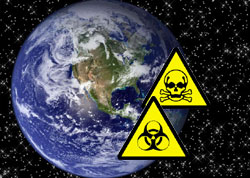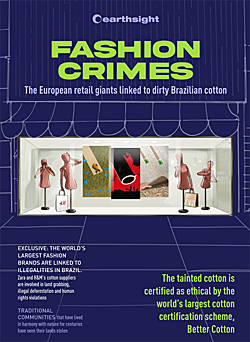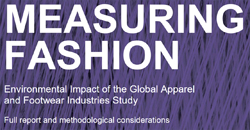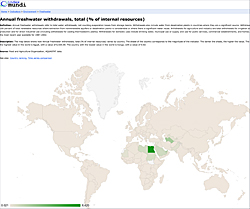 |
|
|
|
You may not realise, but 'Fashion' and it's producers such as; Zara, Forever 21, and H&M are helping to kill off the planet and all human life!
It may take until the end of this century, but according to the UN Environment Programme (UNEP), the fashion industry is the second-biggest consumer of water and is responsible for about 10% of global carbon emissions – more than all international flights and maritime shipping combined! So whilst your trip to the likes of Prema and Zara for cheap and 'fast fashion' clothes may make your week, it will also cost the lives of your children and your children's children. Science now fully understands the part that human activity plays in Climate Change, but more seriously it also knows exactly what global warming is doing to the planet and how, ultimately there is a serious danger to not only human life on Earth, but also to that of most non-human species.
Now, so-called 'fast fashion' no longer relies on this seasonal change, but on churning out cheap creations at a speedy rate in order to maximise profits, and appeal to those who see 'fashion' as a lifestyle to be envied, when in reality it is merely a perfect example of consumerism dictate gone wild! Earth.org explains in more detail just what 'speedy fashion' is all about: " The term ‘fast fashion’ has become more prominent in conversations surrounding fashion, sustainability, and environmental consciousness. The term refers to ‘cheaply produced and priced garments that copy the latest catwalk styles and get pumped quickly through stores in order to maximise on current trends’. The fast fashion model is so-called because it involves the rapid design, production, distribution, and marketing of clothing, which means that retailers are able to pull large quantities of greater product variety and allow consumers to get more fashion and product differentiation at a low price." Apparently, the term was coined after Zara landed in New York in the early 1990s, by the New York Times to describe Zara’s mission to take only 15 days for a garment to go from the design stage to being sold in stores. The biggest players, and by extension, the worlds biggest polluters of the fast fashion world include Zara, UNIQLO, Forever 21 and H&M. Analysis of the industry by Business Insider, claims that fashion production comprises 10% of total global carbon emissions, as much as the European Union. It dries up water sources and pollutes rivers and streams, while 85% of all textiles go to dumps each year. Even washing clothes releases 500,000 tons of microfibres into the ocean each year, the equivalent of 50 billion plastic bottles.
Click the image, left, to download the report from the E-Library. The report also established that fibre production has the largest impact on freshwater withdrawal (water diverted or withdrawn from a surface water or groundwater source) and ecosystem quality due to cotton cultivation, while the dyeing and finishing, yarn preparation and fibre production stages have the highest impacts on resource depletion, due to the energy-intensive processes based on fossil fuel energy. In the report's introduction, it states that:
According to the UN Framework Convention on Climate Change, emissions from textile manufacturing alone are projected to skyrocket by 60% by 2030. The time it takes for a product to go through the supply chain, from design to purchase, is called a ‘lead time’. In 2012, Zara was able to design, produce and deliver a new garment in two weeks; Forever 21 in six weeks and H&M in eight weeks. This results in the fashion industry producing obscene amounts of waste. Fast Fashion and Its Environmental Impact is a serious danger to the planet: Water, Microplastics, and Energy In terms of the social impact: Child Labour, Sweatshops, Governments need to be more actively involved in the fashion industry’s damaging effects. As could be expected, UK ministers rejected a report by members of parliament to address the environmental effects of fast fashion. Yet, French president, Emmanuel Macron has made a pact with 150 brands to make the fashion industry more sustainable and 'Earth Friendly'. You can read more detail from the Earth.org article that this news item is taken from here Source: Earth.org / The Guardian / Parliament UK / Business Insider / UN Reports / unionsafety
|

 In a world that is more and more dominated by 'selfies' and 'body image dismorphia' and the crass 'fashion industry', which is about obsession with outward image and appearance.
In a world that is more and more dominated by 'selfies' and 'body image dismorphia' and the crass 'fashion industry', which is about obsession with outward image and appearance. 


